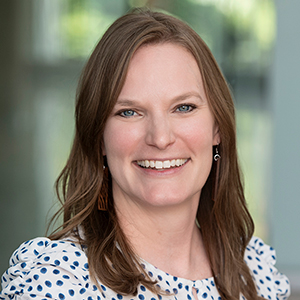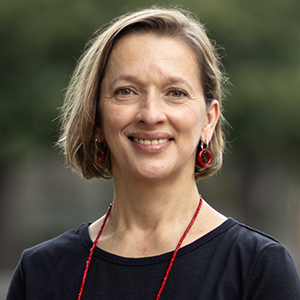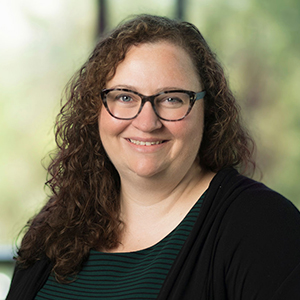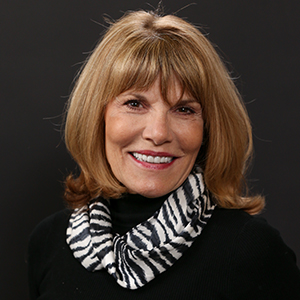Andrea Ford, Ph.D., CCC-SLP

University of Cincinnati
Dr. Andrea Ford is an Assistant Professor in the Department of Communication Sciences and Disorders at the University of Cincinnati. She holds a Ph.D. in Educational Psychology from the University of Minnesota and a M.S. in Speech-Language Pathology from the University of Wisconsin-Eau Claire. She directs the SPARK in Early Childhood Lab, where she and her students partner with early childhood educators to explore ways to increase the adoption and use of evidence-based practices that bolster the language and communication of autistic preschoolers in their authentic educational environments. Most recently, she was awarded a Mentored Patient-Oriented Research Career Development (K23) grant from the National Institute on Deafness and Other Communication Disorders.
In addition to this dissemination and implementation work in the language arena, Andrea is interested in promoting the use of open science practices and principles. What started as a side hustle has quickly evolved into a research line! In collaboration with other open science enthusiasts, Andrea has published several tutorials and empirical investigations on open science practices within the field of speech, language, and hearing sciences, aiming to support the widespread adoption of these practices. She is also a collaborator of CSDisseminate, a group of researchers and clinicians interested in promoting open science in the field.
Session: From Closed Doors to Open Access: Navigating Open Science in Child Language Disability Research
Time: 9:30 – 11:00 AM, Thursday, June 4, 2026
Anny Castilla-Earls, Ph.D.

University of Texas at Dallas
Anny Castilla-Earls is a professor in the Department of Speech, Language and Hearing at the University of Texas at Dallas. Her work centers on bilingual language development and Developmental Language Disorder (DLD), with a special emphasis on Spanish–English speakers. She studies how to identify DLD accurately, how to optimize treatment across one or both languages, and how to support home language maintenance. She collaborates with clinicians and educators to translate findings into practical tools for screening, diagnosis, therapy, and bilingual language support. Her research is funded by the National Institute of Deafness and Other Communication Disorders.
Session: Understanding Language Growth in Bilingual Children with and without Developmental Language Disorder: A Longitudinal Perspective
Time: 1:30 – 3:00 PM, Thursday, June 4, 2026
Arielle Borovsky, Ph.D.

Purdue Universityn
Arielle Borovsky is Professor and Associate Head of Research in Speech, Language, and Hearing Sciences at Purdue University. She directs the Purdue Language Learning and Meaning Acquisition (LLaMA) Lab, which is a dynamic group of researchers across career stages who examine how children learn, process, and represent language. The group employs multiple behavioral and computational approaches and engages with a diverse array of learners to examine how cognitive, linguistic and experiential factors help children to communicate.
Dr. Borovsky earned a BS in Psychology at the University of Florida, a PhD in Cognitive Science from the University of California at San Diego and she completed postdoctoral training at Stanford University and in the Center for Research in Language at UC-San Diego. Her interdisciplinary research appears in multiple scientific outlets spanning fields ranging from developmental psychology, cognitive science, and speech-language pathology. Dr. Borovsky also contributes widely to her professional field and currently serves on the executive board of the Cognitive Science society as president-elect, and is a standing member of the Language and Communication Study Section Panel at NIH.
Session: How does vocabulary structure shape early language growth and delay?
Time: 10:30 AM – 12:00 PM, Friday, June 5, 2026
Ann Kaiser, Ph.D.

Vanderbilt University
Ann P. Kaiser is the Susan W. Gray Professor of Education and Human Development at Peabody College of Vanderbilt University. She is the author of 180 articles and chapters on language and behavior interventions for young children. She is the primary developer of Enhanced Milieu Teaching, a naturalistic early communication intervention and the co-developer of Toddler Talk, a Tier 1 language and social emotional development model for teachers of young children. Her research has been funded by the National Institutes of Health and the US Department of Education. She has contributed more than 30 empirical studies investigating the effects of naturalistic interventions provided by parents and teachers on language development of English and Spanish speaking children. She has received numerous awards for her research including the American Psychological Association’s Edgar Doll Award for Research in Intellectual Disabilities and the Council on Exceptional Children’s J. Wallin Wallace Life-Time Achievement Award.
Session: TBA
Time: 10:30 AM – 12:00 PM, Saturday, June 6, 2026
View previous years’ poster and speaker information in the SRCLD Archive.
 Supported in part by: NIDCD and NICHD, NIH, R13 DC001677, Margarita Kaushanskaya and Audra Sterling, Principal Investigators
Supported in part by: NIDCD and NICHD, NIH, R13 DC001677, Margarita Kaushanskaya and Audra Sterling, Principal Investigators
University of Wisconsin-Madison – Department of Communication Sciences and Disorders